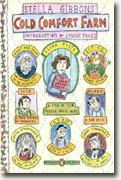Cold Comfort Farm
Stella Gibbons
book reviews:
· general fiction
· chick lit/romance
· sci-fi/fantasy
· graphic novels
· nonfiction
· audio books
· author interviews
· children's books @
curledupkids.com
· DVD reviews @
curledupdvd.com
newsletter
win books
buy online
links
home
for authors
& publishers
for reviewers

 |
Cold Comfort Farm Stella Gibbons Penguin Paperback 256 pages March 2006 |
|
The best satire delights by using wit, a love of words and well-honed skills in choosing them to point up how feeble and fumbling most of us really are. Writer D.H. Lawrence called attention to a lesser acknowledged aspect of the form (often thought merely barbed and mean-spirited) by noting, “For even satire is a form of sympathy.” And sympathy turns out to be a quality possessed by young London sophisticate Flora Poste after she moves in with unknown kin in the country, motivated by a miniscule income and a sense that neither society nor conscience would be troubled by her choice to “impose upon one’s relatives.”
This re-issue of a satiric gem first published in Britain in 1932 demonstrates how it holds up under 21st-century scrutiny. It is benign (as opposed to slashing) and broad-brush in its sly send-ups of both Flora’s “set” in London and of the rurals with whom she elects to reside. The city sophisticates spoofed include a woman friend who amasses a vast collection of brassieres which, the hope is, “would be left to the nation,” and a male acquaintance who visits her in the country and, during shared walks, monotonously points out features of the landscape he declares phallic or suggestive of “large breasts.” To Flora, “imposing” on her rag-tag relatives involves discovering paths by which the abysmal brood can be led out of their mire of generations of uber-dysfunctionalism. Thus, she reasons, they may move up the evolutionary ladder and she may live more peacefully among them (though, at the end, she has developed second thoughts about the latter). Like Charles Dickens, Gibbons obviously relished concocting bizarre names, for the Cold Comfort Farm line-up includes Adam Lambsbreath, Aunt Ada Doom, Urk Starkadder, and Agony Beetle. The cows - called Feckless, Graceless, Aimless, and Pointless – reflect certain core traits of the humans for whom they provide milk and income. At worst, Flora soon understands, the farmhouse habors near-lunacy, as in Aunt Ada’s lifetime fixation on having seen “something nasty in the woodshed” and in distant kin Rennett’s tendency, under the purported spell of the sinister sukebind plant, to jump down the well or try to choke the hired girl. Wisely, Flora does not waste her efforts on re-directing the merely weird, as in cousin Urk, whose free time from farm toil seems mainly spent in “hanging over the well up at Ticklepenny’s, talkin’ to th’ water-voles.” An amazingly fresh (after nearly 75 years!) send-up of a Hollywood mogul emerges in a character named Earl P. Neck, arrived from Beverly Hills to assemble his “annual batch of England’s best actors and actresses” – a form of intercontinental talent poaching that exists still. One of the book’s choicest scenes pits Neck against an intellectually pretentious pursuer of Flora: “Have you ever seen ‘Alexandre Fin’? asked Mr. Mybug. “I saw him in Pepin’s last film . . . very amusing stuff. They all wore glass clothes, you know, and moved in time to a metronome.” The dealer-in-photogenic-flesh is unimpressed: “If your frog friend had to fill fifteen thousand dollars’ worth of movie seats every day, he’d have to think of a better stunt than a lot of guys wearin’ glass pants.”It’s a long established fact that British authors and entertainers are practiced at the art of satire - think P.G. Wodehouse of Bertie Wooster and Jeeves renown then, later, Monty Python, a TV series whose free-form, frenetic style broadened the boundaries of the form. From the beginning, Cold Comfort Farm shows itself as the product of a writer whose acute powers of observation allowed her to see hilarity within all segments of British society. Though she wrote widely and in various genres, it may have been Gibbons’ years as a journalist which served best in fueling her fiction, especially satire. Later books linked to this one include the novel Conference at Cold Comfort Farm (1949) and a short-story collection, Christmas at Cold Comfort Farm (1959). Originally published on Curled Up With A Good Book at www.curledup.com. © Norma Shattuck, 2006 |
|
|
|
 Click here to learn more about this month's sponsor! |
|
| fiction · sf/f · comic books · nonfiction · audio newsletter · free book contest · buy books online review index · links · · authors & publishers reviewers |
|
| site by ELBO Computing Resources, Inc. | |
 And what if not sympathy is behind Flora’s satisfaction, later, at her actual feat of master-minding miraculous transitions within the near-stone age set of relatives inhabiting (some might say infesting) Cold Comfort Farm in Sussex? “Really,” she marveled “when she thought what they had all been like” when she arrived. As one member of the clan had confided, “See, we’m violent folks, we Starkadders. Some on us pushes others down wells. Some on us dies in childer-birth. There’s others as die o’drink or goes mad...”
And what if not sympathy is behind Flora’s satisfaction, later, at her actual feat of master-minding miraculous transitions within the near-stone age set of relatives inhabiting (some might say infesting) Cold Comfort Farm in Sussex? “Really,” she marveled “when she thought what they had all been like” when she arrived. As one member of the clan had confided, “See, we’m violent folks, we Starkadders. Some on us pushes others down wells. Some on us dies in childer-birth. There’s others as die o’drink or goes mad...”